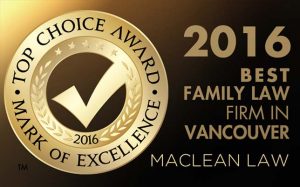
Shared Section 7 Nanny Daycare Expenses are often reasonable and necessary to enable one parent to work or reeducate themselves after relationship breakdown. In other post separation circumstances, when a spouse is ill or disabled, Shared Section 7 Nanny Daycare Expenses may also be awarded by the courts. But an award for these child support expenses is discretionary and must fit within the statutory rules.
MacLean Family Law lawyers have been repeatedly named a Vancouver’s best family law firm* and have won this prestigious Top Choice ranking for 3 out of the past 4 years.
Our experienced team can meet with you at our 6 offices located in Vancouver, Calgary, Surrey, Kelowna, Richmond and Fort St John, BC. Call us toll free 1-877-602-9000.
*(Top Choice Award (2014, 2016, 2017), top rated reviews on Google, Yelp, threebestrated, lawerratingz.com).

How Do Courts Decide To Award Section 7 Nanny Daycare Expenses?
The issue of what must be proven to successfully obtain Shared Section 7 Nanny Daycare Expenses was just addressed by our BC Court of Appeal in the recent 2017 case of Hseih v Lui.
The husband appealed the fact Shared Section 7 Nanny Daycare Expenses were awarded when the wife did not work, was not ill nor disabled and was also not attending school. Although the husband was a high income earner but the Court of Appeal held that this was not an excuse to award a section 7 expense that did not meet the proper section 7 child support guidelines expense.
Did the judge err in finding the cost of a nanny is an appropriately shared s. 7 expense?
[61] Mr. Hsieh submits that the judge erred further in finding the cost of a nanny is an appropriately shared expense under s. 7 of the Guidelines in the circumstances. In support of his submission, he emphasizes the language of s. 7(1)(a), which applies only to child care expenses “incurred as a result of the custodial parent’s employment, illness, disability or education or training for employment”. Given that Ms. Lui is healthy, unemployed and has no plans to study or become gainfully employed, he says there is no need to incur a nanny expense on any of the enumerated bases. Accordingly, he contends, the judge erred in making the award under s. 7 of the Guidelines.
[62] Ms. Lui responds that the s. 7 award is discretionary and entitled to appellate deference. In support of her submission, she emphasizes the fact that Mr. Hsieh is a high-income earner and that s. 15.1(5) of the DA permits the court to depart from the applicable Guidelines where special provisions are made for a child’s benefit and application of the Guidelines would be inequitable.
[63] I do not accept Ms. Lui’s submission. The judge did not purport to depart from the applicable Guidelines pursuant to s. 15.1(5) of the DA. Rather, she found that the cost of a nanny is an appropriately shared expense under s. 7 of the Guidelines. In my view, she erred in so finding.
Do Shared Section 7 Nanny Daycare Expenses Apply When The Claimant Does Not Work?
[64] Section 7 of the Guidelines provides:
7 (1) In a child support order the court may, on either spouse’s request, provide for an amount to cover all or any portion of the following expenses, which expenses may be estimated, taking into account the necessity of the expense in relation to the child’s best interests and the reasonableness of the expense in relation to the means of the spouses and those of the child and to the family’s spending pattern prior to the separation:
(a) child care expenses incurred as a result of the custodial parent’s employment, illness, disability or education or training for employment;
(b) that portion of the medical and dental insurance premiums attributable to the child;
(c) health-related expenses that exceed insurance reimbursement by at least $100 annually, including orthodontic treatment, professional counselling provided by a psychologist, social worker, psychiatrist or any other person, physiotherapy, occupational therapy, speech therapy and prescription drugs, hearing aids, glasses and contact lenses;
(d) extraordinary expenses for primary or secondary school education or for any other educational programs that meet the child’s particular needs;
(e) expenses for post-secondary education; and
(f) extraordinary expenses for extracurricular activities.
Shared Section 7 Nanny Daycare Expenses Must Meet Necessity and Reasonableness Test
[65] An order for contribution to special and extraordinary s. 7 expenses is discretionary. The court may order payment of an enumerated expense taking into account its necessity relative to the child’s best interests and the reasonableness of the expense relative to the means of the spouses and the family’s pre-separation spending pattern: Bodine-Shah at para. 66. In cases involving high-income earners, expenses that may not be considered reasonable for many people may, in context, be reasonable, so long as the award does not enter the realm of wealth transfer rather than support: Francis v. Baker, [1999] 3 S.C.R. 250; Sirdevan v. Sirdevan, 2010 ONSC 2375.
[66] The judge considered it reasonable for Mr. Hsieh to share in the cost of a nanny/housekeeper because the family circumstances previously included a nanny and Olivia continued to engage in a multitude of activities. In reaching this conclusion, she rejected Mr. Hsieh’s contention that the nanny’s tasks were more in the nature of housekeeping than child care, but made no specific findings as to the breakdown of her duties. In particular, the judge made no findings as to which of Olivia’s extracurricular activities involve the nanny’s services or the nature of her current child care duties. Nor did she identify the subsection of s. 7 she considered applicable or the extent, if any, to which Mr. Hsieh contributed to the nanny expense prior to the parties’ separation (paras. 25-26).
[67] In my view, the evidence does not support the conclusion that the cost of the nanny/housekeeper is an expense within s. 7 of the Guidelines. There was simply no evidence that Ms. Lui incurs the nanny expense for child care purposes as a result of her “employment, illness, disability or education or training for employment” (s. 7(1)(a)). In particular, as Mr. Hsieh points out, there was no evidence that Ms. Lui suffers from an illness or disability and she does not work outside the home so does not require child care for purposes of employment. Nor can the nanny/housekeeper’s services be characterized as “extraordinary expenses for extracurricular activities” (s. 7(1)(f)). In the circumstances, despite the fact that Mr. Hsieh is a high-income earner and Ms. Lui was assisted by a nanny prior to separation, in my view the judge erred in awarding the nanny cost as a shared expense under s. 7 of the Guidelines.
Call Our Section 7 Nanny Daycare Expenses Lawyers Now at 1-877-602-9900
While the Appeal court dealt with Section 7 Nanny Daycare Expenses, it also provides the important LESSON that parents who are claiming section 7 special and extraordinary expenses MUST fit the expenses into a proper category AND must show the expenses are necessary and reasonable given the financial circumstances and the past spending history of the spouses.








